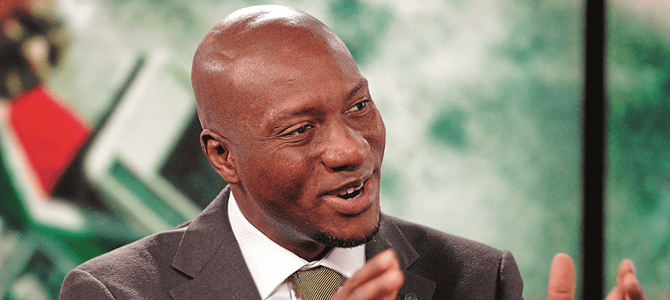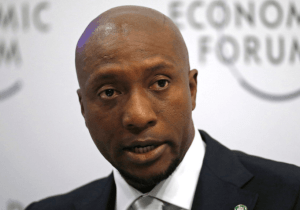Capital Market
Onyema rekindles hope in equities market

The Nigeria Stock Exchange, NSE, which has suffered prolonged and persistent battering received a confidence-boosting endorsement last week when the Chief Executive Officer Mr. Oscar Onyema rekindled hope in market review of 2018 and outlook for 2019.
Mr Onyema who believes it would have been curious had the out- come of the market been otherwise said the NSE will continue to focus of 2018-2021strategy to achieve its long- term objectives.
The poor performance of the Nigerian equity market appears to have repelled investors, especially at the tail end of 2018. The unreassuringly major bench mark (the All share Index) closed negative at -17.81 per cent plunging from 38,243 19 in December 31, 2017 to 31, 430.30 basis points at the end of year 2018.
In the same vein, the market capitalisation within the same period did not perform any better, having slumped -13.87 per cent (- N1.8 trillion) from N13.619 trillion in 2017 to N11.731 trillion in 2018. Lethargy, a sense of loss and fear seem to have pervaded the market as investors are yet to make up their minds on which best investment option to cautiously embrace.
Also, disheartening is that all other subsectors of the market ranging from the banking subsector to Asem closed the year in the negative.The performance of the NSE indices, the management of the bourse noted, followed global trends in the capital market during the year.
For instance, the NSE Industrial Index was most impacted, declining 37.34%, followed by the NSE ASeM Index and NSE Consumer Goods Index, which dropped by 26.99% and 23.28% respectively. The NSE Oil and Gas Index was the least impacted, declining by 8.61%.
”In 2019, we will continue executing on our 2018-2021 strategy, working even more closely with our stakeholders particularly our market intermediaries to onboard new financial instruments and maximize organizational value,” he said.
NSE helmsmanexplained that market sentiments in the first half of the year would be driven by uncertainty in oil prices as well as the 2019 general elections, adding the expected market volatility which will stabilize after the elections.
The NSE boss expressed optimism there will be a return of primary market activities during the year with an up-tick in market activity during the second half of 2019.
Onyema, who noted the NSE’s focus for 2018 had been on organization restructuring, customer centricity, market development, and innovation said the NSE has strengthened its government engagement efforts on privatization and listing of SOEs, in order to take advantage of opportunities within this space during the year.
”We also intend to maintain our collaborative efforts with public and private sector stakeholders to advocate for market friendly policies, and cater to infrastructure financing needs, as well as other capital requirements necessary for sustainable economic growth” he added.
Onyema expressed strong hope that swift approval and implementation of the 2019 budget will have a positive impact on companies’ earnings as well as consumer spending which will in turn galvanise activities in the market.
However, poor macro-economic environment has been fingered for the very weak disposition of the equities market. The Nigeria’s Gross Domestic Product (GDP) had recorded a feeble growth last year from I.9 per cent in the first quarter sliding to 1.5 per cent in the second quarter and rose again to 1.8 per cent in the third quarter 2018.
Price of crude which has hovered between $58 and $65 per barrel has not been able to attain the giddy height of $114 per barrel it reached in June 2008; interest rate is still high; unemployment is hitting the roof top at 23 per cent; at 11.8 per cent, the CBN is still struggling to achieve the single digit inflation rate target; though stable, industry observers would have wished that the exchange rate was still N150/ $1 instead of N363 as at January 16, 2019.
Even though, the growth statistics for the end of year 2018 are yet to be released, the average growth projections for 2019 stands at 2.2 and 1.9 per cent for IMF and Financial Derivatives Company limited, respectively. With the gloomy picture on the horizon, experts in fact, opine that the slow performance of the market reflects the weak economy which the Central Bank of Nigeria (CBN) believes is still feeble.
In the review and outlook for 2019, the NSE argued that NSE ASI which emerged the best performer in Africa and 3rd best globally according to CNN in 2017 became bearishin the second quarter due to political risks, oil price volatility and rising global yields. These, NSE stated resulted in the plunge of All Share Index and equity market capitalization by 17.81% and 13.87%, closing at 31,430.50 and N11.73Tn, respectively.
In spite of the huge losses in the market, NSE boasted to have achieved in addition to getting the demutualisation bill signed, migration of four (4) companies to the Premium Board of The Exchange, launched an index, fine- tuned customer experience and completed the listing of Notore Chemical Industries Plc by introduction.
Interestingly, in the NSE fixed income market, market capitalization increased by 11.76% to N10.17trillion from N9.10 trn in 2017.Itsturnover also increased by 22.34% compared to 2017 driven by a search for an alternative asset class opposed to equities.
In fact, the NSE said Capital raising was dominated by the Federal Government of Nigeria (FGN) who borrowed N1.16 tn in a bid to finance fiscal and infrastructure deficits; inclusive of the maiden N100Bn FGN Ijarah Sukuk designed to finance critical road infrastructure across the country. State Governments raised N125.59Bn in new debt capital, while corporates raised a total of N31.47Bn.
Will the market rebound?
It is difficult to predict with accuracy the capital market however, analysts can make projections based on macro and micro economic environment of any country.
A Lagos based financial analyst, Mr. David Adonri fears that equities may not be very attractive this year given that investors will do more of money and debt securities. He explained that the government will borrow more to fund its budget deficit and crowd out the private sector.
Dr. Afolabi Olowokere of Financial Derivatives Company Ltd believes that human beings will always be optimistic. However, he noted that investors are already not expecting to earn much from the capital market given that market closed the year in the negative.
Olowokere also argued that the long-term trajectory for the market is not dark given that there would be a better direction for the market after the elections.
He added that it becomes a psychological phenomenon when people take decisions based on developments around them. ”People will wait for the elections to get a direction and it also depends on who becomes President”, he said.
Dr. Adi Bongo of Lagos Business School said the price of crude would play a vital role in what shapes the economy in 2019. This, according him will determine how every other sector of the economy is shaped or affected. Of course, strong economy has a way of influencing the market positively and weak economy does otherwise.
A Lagos based financial analyst, Mr. Charles Iyore believes the Nigerian economy lacks what it takes to drive itself.
”The election and the population will be strong determinants of the direction of the economy”, said Dr. Boniface Chizea of BIC Consultancy Services.
”I am not impressed with the GDP growth at 1.8 per cent. It is growing far below the population growth at 3 per cent”, Dr. Tunde Lemo, former deputy Governor, CBN.
The market may pull a surprise but not for many analysts based on economic indicators. Investors have always wished to enjoy a repeat of the market which market capitalization peaked at about N13.1trillion and the All share Index gained a giddy height of 66,551.84 basis points on March 5, 2008.
BH recalls that in the corresponding period of 2017, the market maintained a bullish disposition and investors smiled to the banks. But for the optimists: ”The right triggers to galvanize economic growth are being put in place by the fiscal authorities”.
Continue Reading



